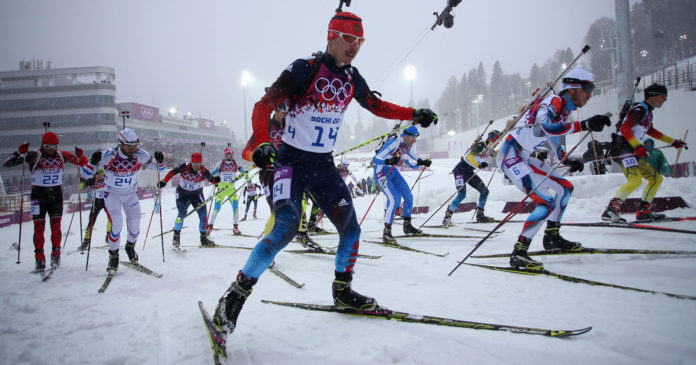MOSCOW — Russia is expected to drop into second place in the gold medal count for the 2014 Winter Olympics after sports officials on Saturday disqualified a biathlon winner for testing positive for a steroid.
If upheld by the International Olympic Committee and on expected appeals, the ruling would signify the final unraveling of a Russian effort to dominate the medal counts by cheating with a state-sponsored doping program.
Fallout from the doping program has for years been whittling away at the number of Russian medals won at the 2014 games the country hosted in the Black Sea resort of Sochi. The supremacy in gold medals in Sochi has been a point of national pride, as high Olympic medal counts have long been for Russia and before that, the Soviet Union.
On Saturday, the International Biathlon Union ruled that Evgeny Ustyugov, who competed in a gold-medal-winning relay team, had used a banned steroid during the 2013 and 2014 seasons. “The consequences include the disqualification of Mr. Ustyugov’s results from the Olympic Games 2014, in which he won a gold medal,” the group said.
If confirmed by the International Olympic Committee, the decision will knock Russia into second place with 10 gold medals, after Norway, which won 11 gold medals, in the Sochi games.
It would also mean Russia would fall into a tie with the United States in the overall medal count from that Winter Olympics, with each nation winning a total of 28 gold, silver and bronze medals. Russia had retained its top gold medal position by successfully appealing previous antidoping rulings that threatened the count.
Four years ago, Russia was caught in one of the most sophisticated doping programs in sports history, one that helped push Russia over the top at the Olympics it hosted. Russia’s own antidoping experts and agents of the Federal Security Service, the successor agency to the K.G.B., carefully studied the bottles in which athletes’ urine was held for testing and, operating at night in a drug laboratory, replaced samples tainted by performance enhancing drugs.
To resolve this case, Russia had agreed to provide a database of test results going back several years before the Sochi games. Though Russia was under tremendous pressure to come clean about the doping program, these computer files, it turned out, had also been tampered with, the World Anti-Doping Agency said in November.
The ruling on Saturday related to this computer tampering, not the manipulations by the Russian security services with the urine bottles.
The data had been altered in an apparent effort to delete electronic files, the World Anti-Doping Agency said. It said files for two biathletes had been deleted but it had nonetheless managed to recover them with the help of computer experts.
The agency didn’t name the athletes. But the announcement by the biathlon organization that it had disqualified Mr. Ustyugov, based on information from the Russian agency, suggested that Russian authorities had tried to cover up his incriminating test results. Mr. Ustyugov has denied wrongdoing.
The unsuccessful effort to delete computer files became the latest chapter in the long-running conflict between antidoping authorities and Russian sports officials. The International Olympic Committee prohibited Russia from competing in the 2018 Winter Olympics. Because of the computer tampering, the World Anti-Doping Agency recommended that Russia be banned from the Summer Olympics this year in Tokyo.
Source : Nytimes












